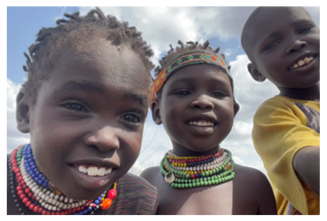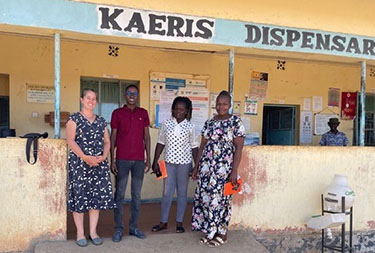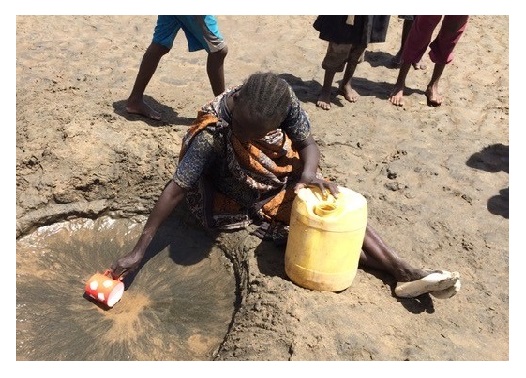
Wendy Prudhomme-O’Meara, PhD — a widely-recognized expert in malaria epidemiology — has dedicated the last two decades to researching community-based approaches for malaria treatment and prevention in Kenya, where malaria deaths have fallen by an estimated 50% in the last 15 years due to public health measures.
Dr. Prudhomme-O’Meara, a professor in the Division of Infectious Diseases and Deputy Director of Duke Global Health Institute (DGHI), has been on the frontlines.
Based at Moi University, DGHI’s partner institution in Kenya, Dr. Prudhomme-O’Meara recently led research for the country’s first pilot program for Seasonal Malaria Chemoprevention (SMC); a preventive measure offered during peak transmission periods involving the administration of antimalarial drugs to children.
The SMC project rolled during the 2024 rainy season between June to October in Turkana — a remote area populated by nomadic pastoralists and a high disease burden area — showed that more than 70% of malaria cases in children can be prevented, and signaled a potential breakthrough in the fight against the disease.

An MIT-trained chemical engineer, Dr. Prudhomme-O’Meara is an advocate for data justice and equitable data governance in global research and leads a team that investigates the intricate biology of transmission and the patient-focused problems of getting appropriate treatment. Her research focuses on malaria disease burden, expanded access to accurate diagnosis and treatment, transmission mapping, and emerging threats to malaria control in vulnerable populations.
As she prepares to head back to Kenya this spring, the professor worries about the health impacts that will result from the withdrawal of foreign aid. Despite public health progress, malaria continues to kill 750,000 children worldwide annually, 95% of them in sub-Saharan Africa.
“Malaria is really a devastating disease, and it continues to exact a heavy burden,” said Dr. Prudhomme-O’Meara, who serves on the Strategic Advisory Group of Experts for the Africa Centers for Disease Control. “In Turkana, when people get sick with malaria, they have to walk an average of 25 kilometers with a sick kid to seek health care. If they take a motorbike, it's expensive. So, not having that burden on their household was something that was really powerful in addition to their kid not getting sick.”
Building Bilateral Relationships, Co-creating Community Solutions
Relieving the burden on individuals and communities has been a priority for Dr. Prudhomme-O’Meara in building the bilateral relationships that support research and deeper understanding of malaria prevention and treatment.

“A lot of what we're doing is about moving medicine forward without leaving anyone behind; improving outcomes for the most vulnerable who've been excluded from these kinds of public health programs in the past,” said Dr. Prudhomme-O’Meara, who teaches in the Moi University master of public health program and mentors post graduates. “This is our work: to shine a light and create an evidence base for what will work in these very unique communities, and partnering with communities to co-create those solutions.”
The professor first arrived in Africa following her doctorate program when a collaboration with KEMRI-Wellcome Trust, a world-renowned health research unit, took her to Kenya in 2007 to study malaria transmission. She planned to stay for a year but became involved with Academic Model Providing Access to Healthcare (AMPATH), a global consortium of academic health centers that work with local health systems to improve care for underserved communities. In 2010, she joined DGHI, which had longstanding partnerships with Moi Teaching and Referral Hospital, and Moi University School of Medicine.
One of her greatest sources of success has been the Kenyan scientists who have served as mentors and — as a great source of pride — the Kenyan trainees engaged in her program.

“I enjoy creating opportunities for others and building something that’s bigger than my research and interests,” said Dr. Prudhomme-O’Meara, whose work with pastoralist communities in Northern Kenya led to the first mass net distribution program in their region. The most rewarding aspects of her research in Kenya, she added, has been the evaluation work, or learning how to adapt large public health programs to these nomadic communities.
Working with the pastoralists, her team outfitted nomadic families with small GPS trackers to understand whether their movements exposed them to greater risk of vector-borne disease. The trackers mapped watering and camping sites where families from different regions gathered, greatly increasing their exposure to malaria, before returning to their villages, with higher rates of infection than when they left.
Her team also identified unexpected species of malaria parasites in the region and invasive mosquito species which are very efficient malaria vectors.
“Current malaria control strategies in Kenya wouldn't cover this invasive vector and this parasite species,” said Dr. Prudhomme-O’Meara, who has also worked with the World Health Organization’s Working Group on Measures of Malaria Vaccine Efficacy. “Working in the Turkana community has been tremendously important. This region and these communities are the frontier. These problems aren't going to stop at the edge of the desert, so responding to them quickly is really important.”
Shining a light on such challenges is critical for national malaria control so that public health strategies can be adjusted accordingly, Dr. Prudhomme-O’Meara pointed out.
Parasitic Genetic Signatures
Professor Prudhomme- O'Meara’s seminal work with a cohort in Western Kenya together with Duke Professor of Medicine Dr. Steve Taylor in the Division of Infectious Diseases, follows generations of malaria infections using parasite genetic signatures to map out transmission networks.

The project has brought exciting insights into how targeted interventions can be used to continue to reduce transmission in areas with high bed net coverage where malaria persists nonetheless. It is not clear if continued transmission is facilitated by human behavior, changes in vector behavior, or increased insecticide resistance of the vectors. Regardless, current malaria control strategies have taken us as far as we can go in some areas and new approaches or tools are urgently needed, the professor said.
Investigators are also trying to leverage the unique design of this cohort to analyze individual transmission events to learn how the human immune system protects from malaria. By examining the blood meal in the mosquito abdomen, the team can identify the individual they fed on the night they are caught and follow the bitten person to see if they get sick.
“We're trying to understand the immune context of that individual that would protect them either from infection or from sickness, so that we can use this information for malaria vaccine design,” Dr. Prudhomme-O’Meara said.
It is important to continue to push the frontier of precision public health using targeted interventions to achieve population level health effects, she added. But she wonders what the next decade will bring for her mission.
“We're already seeing problems with [antimalarial and antiretroviral] drug availability. With 270,000 health care workers in sub-Saharan Africa supported by PEPFAR being furloughed without pay, patients can't get their drugs,” she said. “There's a lot of uncertainty but it’s important to keep talking about it. My hope is that we can keep advocating for vulnerable communities that need help protecting themselves from malaria.”
Professor Prudhomme-O’Meara plans to return to Kenya full time with her family to build capacity in the Kenyan university to compete for funding to support the work.